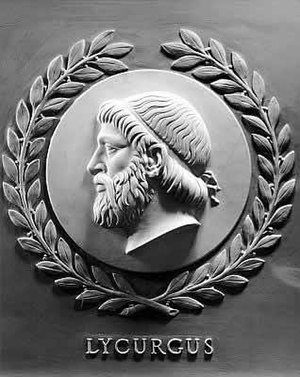Waiting for Lycurgus
When we think of Plutarch’s Lives we often forget that its full title is The Lives of the Noble Grecians and Romans. Sometimes it is called Plutarch’s Parallel Lives because the book alternates biographies of noble Greeks and noble Romans. After the two lives are complete, Plutarch offers a comparison chapter.
In my home, we just finished the parallel lives of Lycurgus and Numa. Lycurgus is the Greek lawgiver responsible for everything we find noteworthy about Sparta: their ‘laconic’ speech, austere lifestyles, and military priority. Numa Pompilius was the Sabine selected to rule Rome after the disappearance of Romulus, Rome’s founder. Numa ushered in a rare period of Roman peace and freedom from war.
When comparing the two men we immediately become aware of two different ways of viewing the world and the uncanny similarities to our own political climate. Plutarch says that Lycurgus oversaw a ‘complete philosophical’ state. Utopians come and go but Lycurgus’s ideals made Lacedaemon (Sparta) the chief city of all of Greece for 500 years. You could argue that Sparta was the only successful socialist experiment in history, for indeed most of Lycurgus’s laws encompass the political idea of socialism. Even the laughter of the Spartans was ruled by laws. Neither land, which was redistributed, nor money nor spouses nor children were free from the government of the state. As in most Utopian ideals man was the servant of the state.
Numa, on the other hand, might be compared to today’s libertarian agrarians. He made the ‘cultivating and subduing the Earth’ a part of religion.
“Numa….wishing to do away with that extreme want which is a compulsion to dishonesty, and , by turning the people to husbandry, to bring them, as well as their lands, into better order. For there is no employment that give so keen and quick a relish for peace as husbandry and a country life, which leave in men all that kind of courage that makes them ready to fight in defense of their own, while it destroys the license that breaks out into acts of injustice and rapacity.”
Numa refused to redistribute Roman land during his reign and set the precedence for that attitude toward private property which remained in place during much of Rome’s history, even while he allowed respect to be given to not only the property owners but also to the slaves who worked the fields, “giving them a taste for liberty.”
My children, Emily (16), Andrew (13) and Alex (10) and I have been reading these two lives and their comparison chapter since late August. When we finished up yesterday I asked them each which city they would rather live in: Rome under Numa or Sparta under Lycurgus? I wasn’t sure which one they would pick because Sparta was by far the more interesting city to read about and boys were especially interested in the preparations for warfare. Furthermore, the rules of Lycurgus lasted long after his death while after Numa died Rome was plunged into years of war.
My general rule is to ask the youngest first, that way I get a feel for how much they understand without the benefit of their older sibling’s answers. Each one of them chose Rome. But our conversation did not stop there. We fell into a discussion of why have any laws at all. None of us liked the idea of living strict Spartan lives. If we threw out some laws why not discard all laws so that we could be truly free? These organic questions led us to discuss the nature of society and the common law we need in order to live in harmony with one another, the differences between principles of truth and rules of behavior, the idea of absolutes. Without a common law or common understanding of the world and self-government we end up being nothing more than barbarians waiting for a Lycurgus to lead us.
And that is why we read Plutarch!












